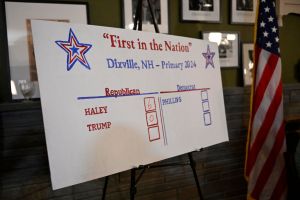What just happened? Some 15 months after the pandemic first struck, it’s still horribly unclear, which is perhaps why there have been no decent books making sense of COVID-19. This is not just about a virus but a collision of politics, panic, digital media, human behavior and incompetence. Niall Ferguson’s Doom looks at each of these aspects, putting them into historical perspective in a book of dazzling range and rigor. He offers several answers — and none of them is comforting.
For most of human history, viruses were unexceptional — hard to research, because no one thought them remarkable. When plagues struck in the Middle Ages, we’d rush into quarantine, which acquired its name in 1383 when Marseilles asked sailors to self-isolate for 40 days. Vaccine passports were attempted in the form of fedi di sanita, certifying that new arrivals had come from plague-free zones — not based on science, Ferguson argues, but observation and ‘a growing reluctance to leave one’s fate in God’s hands’.
Viruses helped as well as hindered the story of the West. We carried Europe’s lurgies over the Atlantic when we discovered America, and they killed more natives than our armies ever did. One of the blessings the Pilgrims gave thanks for at Plymouth in 1621 was that disease had killed off 90 percent of the indigenous peoples, leaving the land free to settle. The Victorians saw disease as a price paid for venturing out into the world. One Royal Commission calculated that of 70,000 British soldiers in India, 4,830 would die each year, requiring 5,800 hospital beds for those incapacitated by illness.
COVID perhaps marks the end of Britain being sanguine about killer viruses. We have long talked about ‘excess winter deaths’ with about 20,000 victims — but because they tend to be elderly, they attract far less concern. If a few hundred young people die of a heatwave, as happened in 2003, it’s an emergency. For all our talk about Spanish flu, Ferguson says the better comparison is the Asian flu of 1957-58, which was as dangerous as COVID in 2020. But it was written up as a nasty flu season.
As science advances and vaccines are found, we’ve shown that we’re prepared to go to far greater lengths, inflicting far greater cost, to prevent infections. The death toll of spring 2020 in Britain, while sickening, was lower than the winters of 1969-70, 1975-76 and 1989-90. But we didn’t, then, have the technology to trace a new virus on its journey around the world, conduct PCR tests, sequence genomes or trace each new variant. Now we do. It’s as if someone has just flicked a switch in a darkened room of viruses and allowed us to see the invisible enemies we’ve been living with all along.
Part of the problem is a false sense of security, the idea that pandemic plans and early-warning systems have taken us out of the danger zone. Ferguson looks at a familiar pattern: he runs through the Titanic sinking, the Hindenburg disaster, Chernobyl, the Challenger crash and more. Each one had mankind’s greatest minds working on a prevention plan, and each time they’d be fooled by something going wrong that they didn’t want to imagine because it complicated the plan. British pandemic strategy was all about influenza. No one imagined that a boring old coronavirus, behind so many common colds, would be the next big thing.
Ferguson’s verdict about the history of lockdowns is brutal. Early attempts to prove their success on limiting the spread of the virus, he says, have ‘evaporated on closer scrutiny’. His near namesake, Neil Ferguson, had predicted lockdown would keep the UK death toll to under 6,700: it was not to be. Germany had fewer restrictions than Italy but was better at restraining the virus. Taiwan had Asia’s lowest stringency and least contagion. Sweden, which never locked down, still managed to force down a first and second wave.
The wildly differing regimes in America suggest that adaptive behavior, not government orders, set COVID’s trajectory. The statistically significant relationship, Ferguson writes, is ‘between stringency and the extent of economic collapse’. There’s a chapter on the economic consequences of the pandemic. He offers some guesses about what follows: that COVID-19 will be to social life what Aids was to sexual life; that cities will survive — but be grungier, with more crime and cheaper accommodation; and that lockdown will make the young permanently more averse to socializing, more prepared to live via their smartphones. Pandemics usually offer historical turning points; perhaps people will be more willing to accept China-style incursions on their liberty and privacy, in the name of staving off the next threat.
Henry Kissinger is quoted as saying that nations tend to be judged on whether their institutions can foresee calamity. So after the pandemic, he says, many countries’ institutions ‘will be perceived as having failed’. This poses the next challenge: might liberal democracy be a victim of the virus? Will China’s government now be able to export its anti-liberal vision to the rest of the world, persuading the West that we’ve been the victim of ineffective governance brought about by our refusal to acknowledge the need for Big Brother and a biosecurity state?
The next year or so will provide the answer to that. ‘To write the history of a disaster that is not yet over is, on the face of it, impossible,’ says Ferguson. His way of saying that, politically, the worst may be yet to come.
This article was originally published in The Spectator’s UK magazine. Subscribe to the World edition here.


















